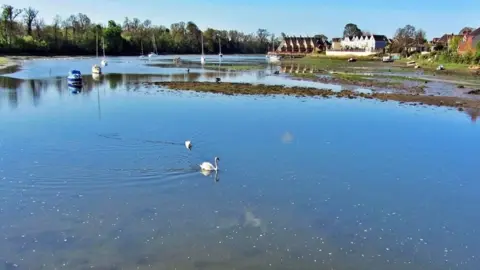Bird flu: Fareham and Ryde swan cases confirmed
 Mack McLane
Mack McLane The remains of a number swans found dead near the Hampshire coast and on the Isle of Wight have tested positive for bird flu.
The Department for Environment Food & Rural Affairs (Defra) confirmed avian flu had been found on swabs taken from three swans found at Fareham Creek.
A dead swan found at Ryde Canoe Lake was also confirmed as having the H5N8 strain of avian flu.
Defra has urged bird owners to observe strict biosecurity precautions.
Councillor Tom Davies, for Fareham East ward, said there had been "a deluge of dead swans with apparently no cause" in the past few weeks.
"It's obviously shocking news but it's important to note this is a strain with a very low threat to human life. There are now concerns for the other swans present in the creek," he added.
He said water pollution had been considered as a possible cause of the deaths and testing for lead poisoning had been carried out, but this had been ruled out.
 Ian S
Ian SAn Isle of Wight Council statement confirmed that after several reports of dead swans in the area of Ryde Canoe Lake, tests on the remains of one showed avian influenza was present.
"As birds will move about this is not confined to any one location but could be present wherever wild birds gather," it said.
Footpaths around the lake have been cordoned off as a precaution.
Kay Ounsworth, of the Isle of Wight Bird Rehabilitation group, said an outbreak was the "last thing the island needs".
"We're a small farming community and, if it is bird flu, people could easily walk from the lake and spread it through farm land."
The lake is known to be home to wildfowl including Canada geese, tufted ducks and mallard as well as white and black swans.
Following an increases in cases of H5N8 bird flu nationally, an Avian Influenza Prevention Zone (AIPZ) was put in place across England meaning all commercial and domestic bird keepers are required by law to take a range of biosecurity precautions including keeping their birds indoors.
There are numerous strains of bird flu. Most are low risk to humans, or are not easily caught and spread by humans.
Members of the public are also advised not to touch dead or visibly sick wild birds to prevent spreading the disease.
